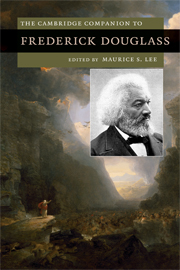Book contents
- Frontmatter
- Introduction
- 1 Douglass’s Self-Making and the Culture of Abolitionism
- 2 Identity in the Autobiographies
- 3 Douglass as Orator and Editor
- 4 Crisis and Faith in Douglass’s Work
- 5 Violence, Manhood, and War in Douglass
- 6 Human Law and Higher Law
- 7 Sentimental Douglass
- 8 Douglass among the Romantics
- 9 Douglass’s Black Atlantic: Britain, Europe, Egypt
- 10 Douglass’s Black Atlantic: The Caribbean
- 11 Douglass, Ideological Slavery, and Postbellum Racial Politics
- 12 Born into Slavery: Echoes and Legacies
- Guide to Further Reading
- Index
Introduction
Published online by Cambridge University Press: 28 July 2009
- Frontmatter
- Introduction
- 1 Douglass’s Self-Making and the Culture of Abolitionism
- 2 Identity in the Autobiographies
- 3 Douglass as Orator and Editor
- 4 Crisis and Faith in Douglass’s Work
- 5 Violence, Manhood, and War in Douglass
- 6 Human Law and Higher Law
- 7 Sentimental Douglass
- 8 Douglass among the Romantics
- 9 Douglass’s Black Atlantic: Britain, Europe, Egypt
- 10 Douglass’s Black Atlantic: The Caribbean
- 11 Douglass, Ideological Slavery, and Postbellum Racial Politics
- 12 Born into Slavery: Echoes and Legacies
- Guide to Further Reading
- Index
Summary
When Frederick Douglass in 1851 changed the name of his newspaper from The North Star to Frederick Douglass' Paper, he joked, “I shall lose my reputation for being unstable if I don't change soon” (LW 2:223). Change is indeed a major feature of Douglass’s life and writings, as is his sensitivity to his reputation in an often-critical public eye. Douglass rose to fame with the extraordinary success of his 1845 autobiography, Narrative of the Life of Frederick Douglass, An American Slave, Written By Himself (1845). The book, which forever altered Douglass’s life, is itself a carefully crafted record of personal transformations - from Douglass’s loss of childhood innocence under the brutality of chattel bondage, to his battle with the slave-breaker Covey (which Douglass describes as a “turning-point in my career as a slave” [N 65]), to his escape in 1838 into what he later called the “nominal” freedom of the North (LW 1:279), to his rebirth as a speaker in the American Anti-Slavery Society under the leadership of the white evangelical William Lloyd Garrison. After traveling through Great Britain in 1845-47 and having his freedom purchased by abolitionist friends, Douglass distanced himself from Garrison’s influence and founded the newspaper that would eventually take his name, thus announcing himself as the most prominent black leader and writer in the English-speaking world.
Douglass’s transformations would continue. He became increasingly militant with the coming of the Civil War, defending John Brown’s 1859 raid on Harpers Ferry and recruiting African American soldiers for the Union Army. After the war, he made an uneasy transition from radical reformer to political appointee, holding noteworthy positions in Republican administrations during and after Reconstruction. By the time of his death in 1895, Douglass was an international figure recognized as an orator, writer, statesman, and representative of his race.
- Type
- Chapter
- Information
- The Cambridge Companion to Frederick Douglass , pp. 1 - 12Publisher: Cambridge University PressPrint publication year: 2009



